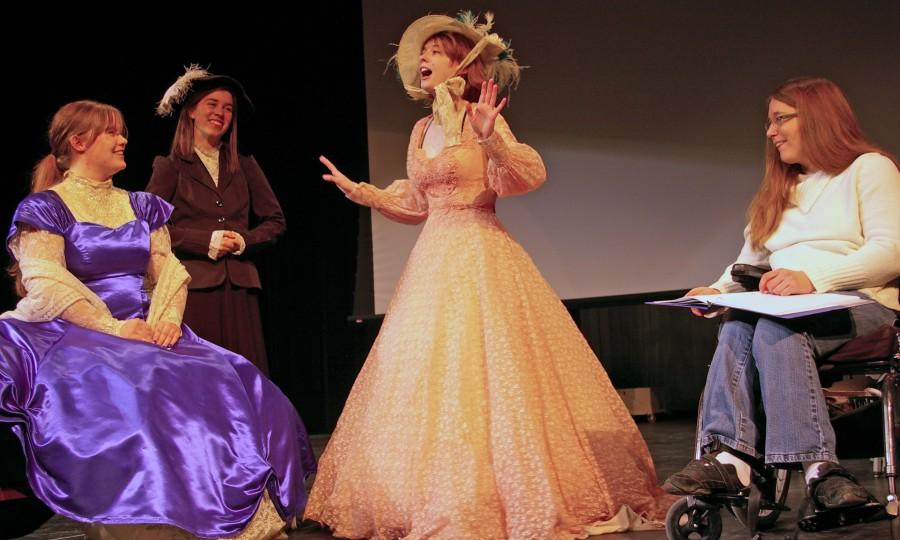Breathing life into local history, IVCC’s ‘Legacy’
Elizabeth Voitik (left), Yvette Lucas (center left), Anna Klobnak (center right), and assistant director Megan Norlin (right) rehearse scenes from Legacy.
When IVCC sophomore Megan Norlin wanted romantic heroes for a play she was writing, she didn’t have far to look.
Her dashing Civil War general whose life is cut short on the battlefield at Shiloh, Tenn., was real. So was the devoted wife who crosses enemy lines to hear his dying breath. Brigadier Gen. W.H.L. Wallace lived in Ottawa and has gone largely unrecognized since his death 153 years ago. His widow, Ann Dickey Wallace, dedicated a stained-glass church window to his memory.
At her theater instructor’s request, the aspiring playwright wove the Wallaces’ letters and lives into “Legacy – A Love Story in the Shadow of Lincoln.”
It languished, never performed until eight years later. Norlin — now a theater school graduate — will hear her words live and breathe when “Legacy” is staged in conjunction with a traveling museum exhibit celebrating Abraham Lincoln. The play’s director, Dr. David Kuester, says it’s the first full-length play written by a student to be performed at IVCC.
It’s not quite the same play, nor is Norlin quite the same as when she wrote it.
“I did a lot of growing up in my 20s, and that version of me seems so far away. It’s weird hearing words you wrote when you were a ‘baby,’” the 29-year-old says. “When I was writing, I only heard the words in my head or read them on the computer. It’s exciting to hear somebody else say them. It’s scary handing over what you made to somebody else, but it’s thrilling to see what they make of it.”
Joining the Wallaces on stage now are other local historic figures, such as Troy Grove’s own Wild Bill Hickok, the swashbuckling frontiersman. Adding a dash of spice to the mix is Tennessee Claflin, who emerged from a shady past to conquer Wall Street at a time when woman’s place was at home. She lived for a time in Ottawa before joining her sister, suffragette and presidential candidate Victoria Claflin Woodhull, in a successful brokerage.
Lincoln, a friend of the Wallaces whose Illinois Valley ties are a reason IVCC wanted to host the exhibit, also has a role.
A veteran of IVCC improv troups, Norlin first wrote historical skits for presentations at the Hegeler-Carus Mansion in her hometown of LaSalle. At IVCC, Kuester recognized her talent and encouraged her writing.
The pair shares writing credits: Kuester contributed the Hickok and Claflin segments. They discussed, critiqued and tossed ideas back and forth.
Kuester was a benevolent mentor, Norlin says. “He was generous enough to share this with me. Sometimes he reined me in and taught me to be more selective (about what to include or leave out.). He made room for me. It’s so nice to have a place like IVCC and people like him who’ll find a place for you.”
Kuester believes Norlin’s treatment of the Wallace-Dickey romance “humanized the cut-and-dried war we tend to think about, reminding us that real people loved each other and lost lives and cared about the world in a strong and passionate way.”
Kuester admires Claflin and Hickok for their spunk. “(The Claflin sisters) went through adversity and came out winners. They may have gone about their profession in a totally immoral and amoral way, but I admire them for having the gumption to see their dreams through.”
Hickok was “a big, booming character. He is so much a part of what America was – he was a superhero of the time.”
While she admits she’d love to sit and talk with Wallace, whom she describes as a “good-hearted and passionate man,” Norlin might have rewritten Ann’s part if she wasn’t trying to be true to history. “She charges on the battlefield, risking life and limb, right? But the practical part of me was saying, you have an adopted daughter at home who’s already been orphaned once. For the sake of your daughter, go home!”
Norlin, who has cerebral palsy and uses a wheelchair, works part time for the Illinois Self-Advocacy Alliance, which helps people with disabilities. She was happy to return to IVCC as the play’s assistant director, and would like someday to start a theater/school that will be a “theater utopia open to everyone. That sounds very ‘King Arthur’ of me. I don’t care if I make money; I just want to keep theater in my life.”
Meanwhile, she’s reserving opening-night nerves for the cast. “There’s a point in writing or directing a play when you just have to go, ‘OK, it’s yours now.’ If you write a play and aren’t willing to let it go, you don’t have confidence in your own work.”
Delving into the Wallaces’ lives opened her eyes to her surroundings. “Most people tend to think that nothing good or interesting happens in their hometown, but you never know what you’ll find looking in your own backyard!”
Kuester agrees. “People are unaware of the great adventure stories that come from this area. Every chapter in American history was played out here, stories that linked us to the rest of the world.”

